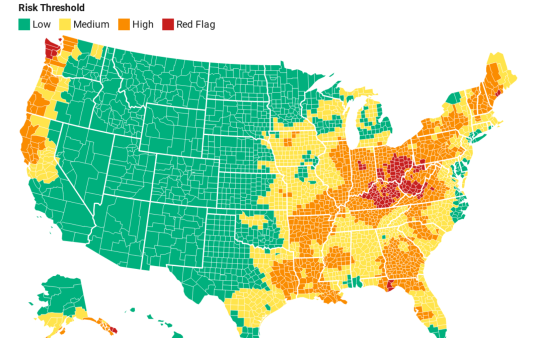Consumer bankruptcy filings in the U.S. rose 16 percent to 434,064 in the year ending December 2023, compared with 374,240 in December 2022. Both Chapter 7 and Chapter 13 bankruptcies saw increases. This is the fourth straight quarter of rises in bankruptcy filings, following a decline of over a decade. Homeowners may consider bankruptcy when they’re facing foreclosure. But there may be different outcomes depending on which they file they should discuss with an attorney before they do.
Chapter 7 bankruptcy is a liquidation proceeding in which a Chapter 7 trustee is appointed and liquidates a debtor’s non-exempt assets that may include a sale or surrender of real estate and other property. Most debtors who file Chapter 7 bankruptcy receive a discharge of unsecured debt, like credit card debt.
It’s important to note, however, that a Chapter 7 bankruptcy may not protect a homeowner from a foreclosure. For example, if a homeowner is substantially behind on their mortgage and their lender is unwilling to modify their loan, the lender may petition the bankruptcy court to proceed with foreclosure proceedings.
Chapter 13 bankruptcy is a reorganization of debt and allows debtors to establish a court approved repayment plan and restructure their debts and potentially save their homes or vehicles. For homeowners seeking to prevent foreclosure, a Chapter 13 debt repayment plan is an option worth exploring with a lawyer.
The rise in bankruptcies reflects economic stress among Americans, which disproportionately affects the low-income communities BlueHub SUN primarily serves. These residents experience inflation, higher interest rates and student loan payments resuming more intensely. These stressors may mean higher home foreclosure rates in vulnerable communities, leading more homeowners under economic duress to pursue bankruptcy when their debt overwhelms them.
“Debtors are hardworking people like you and me,” says Margaret A. Burks, Esq., Chapter 13 Trustee, Office of the Trustee—Cincinnati.
Those who don’t meet the requirements for filing Chapter 7 may find themselves in Chapter 13, which may allow them to keep their homes. It’s essential for foreclosure non-lawyer prevention specialists to collaborate with a homeowner’s bankruptcy attorney to help their clients in bankruptcy succeed in saving their homes, which can be more complicated in a Chapter 13 bankruptcy.
Understanding the Link between Chapter 7 Income Limits and Chapter 13 Eligibility
The Bankruptcy Code requires that individuals seek credit counseling before they file for bankruptcy under either Chapter 7 or 13. But, homeowners still may end up in bankruptcy and bankruptcy process is complex, regardless of which bankruptcy chapter a homeowner files under.
So, while consumers can file for bankruptcy on their own, for the best results, filing for bankruptcy should start with a homeowner working with a qualified consumer bankruptcy attorney in their state. Since they must get credit counseling before filing for bankruptcy, they should work with a credit counselor recommended by the federal government.
“Consumers need an attorney who’s committed to bankruptcy work and likes what they do,” says Paul Young, a Pennsylvania and New Jersey bankruptcy attorney at Young, Marr, Mallis & Associates, with over 30 years of experience. “Their attorney needs to be empathetic, care why the client is in their financial position, and be committed to helping them resolve their issues,” Young emphasized.
A qualified attorney in their state can help clients determine where they fall within the means testing income requirements for filing Chapter 7. Means testing, which compares a debtor's income to the median income for their state, as identified in census data, determines bankruptcy eligibility. These guidelines are updated annually based on the latest census data.
They affect Chapter 13 filings because if a debtor is at or above the income limits for their family size for filing Chapter 7 in their state, they will not qualify for Chapter 7 and must file under Chapter 13. Having higher income presumes debtors have the means to pursue a Chapter 13 repayment plan.
But those with higher value assets—like significant equity in their homes—may still lack the necessary disposable income to make payments under a plan, making a Chapter 13 plan not feasible. That, again, is where attorney guidance becomes important. “I see situations like this often,” says Young. People call him believing their higher assets will allow them to file Chapter 13 only to learn that might not be possible.
“The best repayment plans I see are from a good attorney and a debtor who’s committed to meeting the requirements of their Chapter 13 bankruptcy,” says Burks. “Those plans also have a good budget that truly identifies what the debtor’s real income and expenses are.” Those are the plans most likely to help the debtor succeed with their financial reorganization and save their home.
Here are the means testing income guidelines for filing Chapter 7 bankruptcy as of November 1, 2023, in 11 states where BlueHub SUN operates.

*Add $9,900 for each individual in excess of 4. (Source: Department of Justice)


